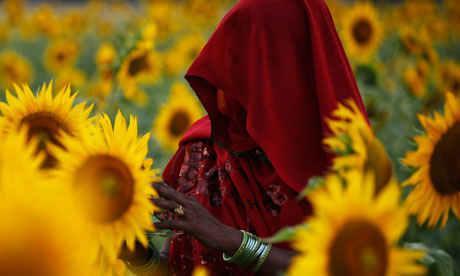Kusum will head back to her family's home for a wedding next week, travelling 500 miles east of Delhi, deep into the heart of the northern Uttar Pradesh state. The 33-year-old arrived in the Indian capital 15 years ago hoping for a better life with husband and young son. Since then, life has been "good and bad," she said.
The good was that Kusum did not take long to find a job as a maid with a wealthy Indian family. She earns 5,500 rupees a month (about £75) for a six-day week and considers herself well-paid.
"They are nice people and do not make me work too hard and try and look after me," she told the Guardian.
But there are many demands on the money she earns. Kusum, who can only read or write at a rudimentary level, comes from a family of largely illiterate farmers. With her job in the capital, she is seen as the source of funds for much of her family.
The latest demand is to contribute to the marriage of her sister-in-law's son. Not only is dowry routinely paid in most of India but a wedding itself incurs huge expense, even in the poorest communities. Almost all matches are arranged. A "love marriage" is almost unheard of, Kusum said.
Married herself at 15, Kusum has set some cash set aside secretly from her husband, who drinks heavily. It is hidden in the box she keeps in their two-roomed home in an illegal slum settlement near railway tracks in south Delhi. But her husband suspects she is hiding cash and beats her regularly. She once thought of opening a bank account but was told she would need her husband's consent.
Her husband, a day labourer, already beats her if she doesn't give him her monthly salary. Kusum has tried to go to the police but was told off for being "a bad wife" and mocked on each occasion.
Domestic violence is endemic in India and the police intervene only in very extreme circumstances. A few weeks ago Kusum's husband broke her finger. Previously, he damaged her jaw. She cannot leave him, she says, because she has nowhere to go and because the "shame" in her village would be too great. And they have a son, Vishal, who she needs to look after.
There are problems now with Vishal, too. He has been keeping "bad company", she says, and has been expelled from the free public school for non-attendance. Her employers got the 15-year-old readmitted but the officials at the school now harass her because she does not have the proper documentation, such as birth certificates and proof of address, so she has to pay them off.
Kusum is a dalit, from the lowest rank of the social hierarchy that still causes deep discrimination in India, which does not help matters. "Life is not easy," she said.




